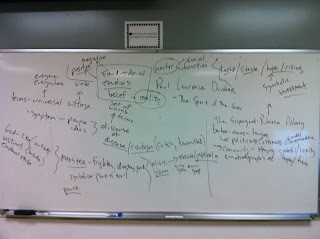 Before we began looking at the stories, we read over the preface from Gustave Le Bon's The Crowd, first published in France in 1896 and translated into English the following year. We discussed how Le Bon considered the crowd a threatening collection of urban masses, who were bent on organizing themselves into unions and demanding suffrage. He contrasted these self-determining rights of the crowd with his stance that crowds were built for destruction, could not reason, and appeared when "civilizations" were in their collapse.
Before we began looking at the stories, we read over the preface from Gustave Le Bon's The Crowd, first published in France in 1896 and translated into English the following year. We discussed how Le Bon considered the crowd a threatening collection of urban masses, who were bent on organizing themselves into unions and demanding suffrage. He contrasted these self-determining rights of the crowd with his stance that crowds were built for destruction, could not reason, and appeared when "civilizations" were in their collapse. In Dunbar's story "Scapegoat," the class made a number of interesting observations. The main character, Robinson Asbury, had a special relationship to his black community because he remained in the neighborhood of 'the people' even as his success as a barber and then as a lawyer could have allowed him to taken off to better streets. He decides to enter politics, and a clique of the town's old guard prevents him by nominating a stooge candidate, a local school principal, to compete against him. He cannot raise as many people in an annual parade, however, which portends he won't be able to raise votes. After Asbury wins the election, the group backing the principal (Morton) cries "fraud," and the old guard are only too happy to see the election battle go to trial. Here, the class made much of the fact that Dunbar explains the cries of "fraud" as protests by those that had ulterior emotional motives. We played this into a conversation that shuffled around the ways emotion and belief are tied together, and how people with emotional investments can refuse to believe in reality if it doesn't fit their emotional paradigm. For many, Asbury was a symbol and a model for them. He embodied their hopes. For others he was the opposite.
In Dunbar's story "Scapegoat," the class made a number of interesting observations. The main character, Robinson Asbury, had a special relationship to his black community because he remained in the neighborhood of 'the people' even as his success as a barber and then as a lawyer could have allowed him to taken off to better streets. He decides to enter politics, and a clique of the town's old guard prevents him by nominating a stooge candidate, a local school principal, to compete against him. He cannot raise as many people in an annual parade, however, which portends he won't be able to raise votes. After Asbury wins the election, the group backing the principal (Morton) cries "fraud," and the old guard are only too happy to see the election battle go to trial. Here, the class made much of the fact that Dunbar explains the cries of "fraud" as protests by those that had ulterior emotional motives. We played this into a conversation that shuffled around the ways emotion and belief are tied together, and how people with emotional investments can refuse to believe in reality if it doesn't fit their emotional paradigm. For many, Asbury was a symbol and a model for them. He embodied their hopes. For others he was the opposite. Asbury can't defend the corruption of the vote, apparently, but during the trial exposes the rest of the political machinery as just as guilty as he. He goes to jail for a year and comes out stronger; from that point forward, his status among the people as a martyr allows him to influence local town politics from behind the scenes.
No comments:
Post a Comment